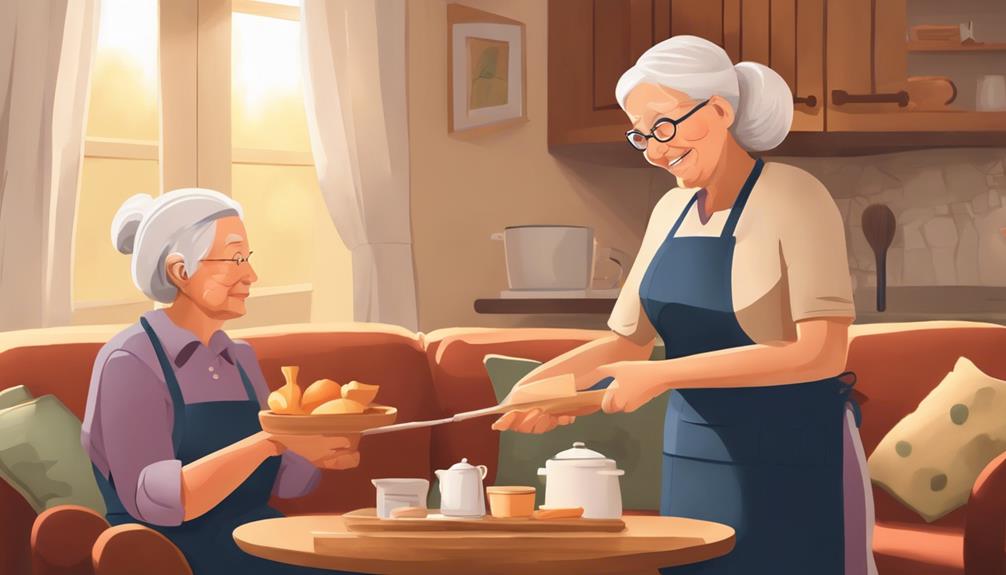To keep our memory sharp as we age, we should engage in memory games, learn new skills, and participate in sensory-rich activities. Regular physical exercise like walking and dancing, along with strength training, boosts brain health. Quality sleep and mindfulness practices are essential for memory retention. Limit alcohol intake and focus on moderate consumption for ideal brain function. Continuous learning and skill expansion help enhance cognitive function. Activities like chess can improve memory retention and strategic thinking. Implementing strategies such as exercise, social interactions, and a nutritious diet supports brain function. Discover more ways to maintain an ageless memory by exploring strategies that stimulate your brain.
Key Takeaways
- Engage in memory-boosting activities like puzzles and learning new skills.
- Maintain regular physical exercise, including cardio and strength training.
- Prioritize quality sleep aiming for around 8 hours each night.
- Limit alcohol consumption to support ideal brain function.
- Practice mindfulness techniques like meditation for enhanced memory retention.
Memory-Boosting Activities for Seniors
Engaging in various stimulating activities such as crossword puzzles, Sudoku, and memory games can greatly enhance cognitive functions in seniors. These memory games challenge the brain, improve problem-solving skills, and boost memory retention. Additionally, learning new skills like a language or musical instrument can also help seniors maintain mental agility and memory. By stepping out of their comfort zones and engaging in activities that require active learning, seniors can keep their minds sharp and adaptable.
Participating in sensory-rich activities such as art classes or gardening is another way to boost memory and cognitive abilities among the elderly. These activities stimulate different senses, encouraging brain plasticity and enhancing memory functions. Also, regular daytime naps have been shown to benefit memory performance and overall cognitive function in older individuals. Ensuring that seniors get adequate rest, including short naps during the day, can significantly contribute to their brain health and memory retention.
Importance of Physical Exercise for Memory

Regular physical exercise is key to maintaining a healthy brain.
Cardio activities like walking or dancing help boost cognitive health.
Strength training aids memory retention and overall brain function.
Exercise Boosts Brain Function
To enhance memory and cognitive function in older adults, engaging in physical exercise is key due to its ability to increase blood flow to the brain and promote the growth of new brain cells. Regular exercise, such as brisk walking or dancing, can notably improve brain function, memory preservation, and decision-making skills.
By committing to at least 150 minutes of moderate aerobic activities weekly, individuals can lower the risk of cognitive decline and memory loss. Even vigorous aerobic exercises for 75 minutes each week offer similar brain-boosting benefits, supporting overall brain health.
It's beneficial to spread out physical activities throughout the week in shorter sessions to maximize the positive impact on brain function and memory retention. Stay active to keep your brain sharp and memory intact!
Cardio for Cognitive Health
Enhancing cognitive health through cardio exercises is vital for maintaining memory function in older adults. Regular cardiovascular exercise, such as walking, running, or swimming, increases blood flow to the brain, promoting cognitive function.
These physical activities stimulate the release of chemicals that enhance brain health and memory retention. Engaging in aerobic workouts for at least 150 minutes per week can greatly improve memory and thinking skills, reducing the risk of memory decline.
Strength Training for Memory
Enhancing memory function in older adults can also be achieved through engaging in strength training exercises, which have been shown to improve cognitive function and memory retention. Strength training, like weightlifting or resistance bands, can boost memory performance and mental acuity.
Regular resistance training promotes neuroplasticity and reduces cognitive decline, enhancing brain health. By participating in physical exercise, including strength training, older adults can increase the production of growth factors that support memory retention.
Incorporating strength training into your routine is essential for maintaining cognitive abilities and preventing age-related memory loss. So, remember to include strength training in your exercise regimen to not only stay physically strong but also to keep your memory sharp as you age.
Impact of Quality Sleep on Memory

Quality sleep plays an important role in supporting effective memory consolidation in the brain. When we prioritize quality sleep, we are giving our brain the opportunity to organize and store memories properly, which is vital for top cognitive function. Research shows that poor sleep quality can lead to reduced frontal lobe function, directly impacting our memory. To enhance memory retention and cognitive function, consider incorporating naps into your routine. Aim for around 8 hours of sleep each night to maximize memory consolidation and overall brain health. Implementing strategies to improve the quality of your sleep, such as creating a relaxing bedtime routine or ensuring a comfortable sleep environment, can notably benefit your memory functions. Let's take a look at how quality sleep influences memory:
| Quality Sleep & Memory | Impact | Recommendation |
|---|---|---|
| Supports memory consolidation | Essential for memory | Aim for 8 hours per night |
| Reduces frontal lobe impairment | Affects memory | Incorporate naps for improvement |
| Enhances cognitive function | Boosts memory | Enhance sleep quality strategies |
Benefits of Moderate Alcohol Consumption

In examining the subject of moderate alcohol consumption, it's important to acknowledge the potential benefits it can offer when approached with mindfulness and moderation. While excessive alcohol consumption can lead to cognitive problems and memory decline, moderate alcohol intake has been associated with certain brain health benefits. Limiting alcohol intake is vital for maintaining ideal brain function and memory.
Men who consume more than 2.5 drinks per day may experience memory decline sooner. To preserve cognitive abilities, using smaller glasses to moderate alcohol consumption is a helpful strategy. It's essential to take into account the long-term impact of alcohol on cognitive function for memory preservation.
Mindfulness Practices for Memory Improvement

Engaging in mindfulness practices, such as meditation and deep breathing, can greatly enhance memory retention and focus. Mindfulness techniques offer a pivotal tool for improving memory and cognitive function. Here are some ways mindfulness practices can benefit memory improvement:
- Deep Breathing: Deep breathing exercises help calm the mind and increase oxygen flow to the brain, promoting better focus and memory retention.
- Meditation: Regular meditation practice can enhance concentration and reduce stress, both of which are vital for maintaining a sharp memory.
- Mindful Counting: Incorporating counting techniques into your mindfulness routine can boost memory function by sharpening your attention to detail and enhancing mental clarity.
Crossword Puzzles and Brain Health

Regularly solving crossword puzzles enhances cognitive abilities and improves memory recall and verbal fluency. Engaging in crossword puzzles challenges the brain, stimulating various areas and promoting mental agility. Studies suggest that working on crossword puzzles can delay cognitive decline in older adults by strengthening neural connections and boosting memory function. The mental effort required to solve these puzzles exercises the brain, improving overall cognitive abilities. By consistently solving crossword puzzles, individuals can keep their minds sharp and maintain better memory function as they age.
Crossword puzzles serve as a fun and effective way to keep our brains active and healthy. The problem-solving and critical thinking skills needed to complete these puzzles can have long-lasting benefits for our cognitive well-being. So, next time you have a spare moment, consider grabbing a crossword puzzle and challenging your brain to stay sharp and focused.
Learning New Skills for Cognitive Function

Learning new skills is a fantastic way to keep our brains sharp as we age. Engaging in activities like painting or playing a musical instrument can boost brain health.
Studies have shown that acquiring new skills can help our brains stay flexible and improve memory retention.
Brain-Boosting Activities
Exploring new hobbies and skills can greatly enhance cognitive function and memory retention in older adults. Engaging in brain-boosting activities is a fun way to keep our minds sharp. Here are some ideas to get started:
- Learning a new musical instrument
- Trying out painting or other creative arts
- Solving puzzles or playing strategy games
These activities stimulate the brain, promote neuroplasticity, and improve memory performance.
By challenging ourselves with new skills, like learning a language or taking up a hobby, we can foster neural connections and potentially reduce the risk of memory decline.
Continuous Learning Benefits
Engaging in a variety of new activities can greatly enhance cognitive function and memory retention in older adults. Learning new skills like playing a musical instrument or mastering a new language can stimulate the brain, improving memory performance.
Research indicates that acquiring new skills later in life can form new neural pathways, enhancing cognitive abilities. Actively pursuing learning opportunities has been shown to boost memory and mental agility in older adults.
Skill Expansion for Memory
Expanding our repertoire of skills not only enriches our cognitive abilities but also plays an important role in enhancing memory function as we age. Learning something new, whether it's painting, playing an instrument, or cooking, can stimulate our brains and improve cognitive function. Acquiring fresh skills creates new neural pathways in the brain, which in turn enhances memory retention and mental agility.
Research indicates that challenging our brains with novel tasks can delay cognitive decline, benefiting overall brain health. Engaging in skill expansion activities not only boosts self-esteem and confidence but also provides a sense of accomplishment, positively impacting mental well-being. Continuous learning and skill development in older age are essential for maintaining cognitive abilities, memory, and overall brain function.
Chess and Memory Retention

Chess serves as a powerful tool for enhancing memory retention by challenging strategic thinking and problem-solving skills. When we engage in a game of chess, we aren't only having fun but also exercising our brains in a way that boosts cognitive function.
The game requires us to remember previous moves and anticipate future ones, which can greatly improve our memory capabilities over time. Research indicates that regular chess play can enhance memory performance across all age groups.
Additionally, the complexity of chess provides a unique workout for our brains, potentially reducing the risk of memory decline as we grow older.
Implementing Strategies for Cognitive Health

Shifting from chess and memory retention, one effective way to foster cognitive health is by introducing various strategies that support brain function and memory preservation. To enhance cognitive health, consider the following:
- Engage in regular physical exercise: Physical activity improves blood flow to the brain, supporting cognitive function.
- Prioritize social interactions: Combat stress and depression, which can contribute to memory loss, by engaging with others.
- Maintain a nutritious diet: A diet rich in fruits, vegetables, and lean proteins supports cognitive function and memory preservation.
These strategies play an important role in keeping our brains sharp and memory intact. By incorporating physical exercise, social interactions, and a nutritious diet into our daily routines, we can promote cognitive health and overall well-being.
Frequently Asked Questions
How Can I Help My Memory Loss in Old Age?
We can enhance memory in old age by prioritizing exercise, a balanced diet, quality sleep, mindfulness practices, and limiting alcohol intake. These actions support brain health, cognitive function, and memory retention, promoting overall well-being.
Which Vitamin Help to Protect Against Memory Loss in Old Age?
Vitamin E can help protect against memory loss in old age. It's found in nuts, seeds, and leafy green vegetables. Adding Vitamin E through diet or supplements may support cognitive function in seniors. Consult a healthcare provider before starting any new regimen.
How Can We Prevent Memory Deterioration?
To prevent memory deterioration, we engage in mental, physical, and social activities regularly. We adopt a heart-healthy lifestyle, stay mentally stimulated through various activities, and control factors like high blood pressure. Seeking professional advice early is essential.
What Are Cognitive Strategies for Short Term Memory Loss?
We focus on cognitive strategies for short-term memory loss. Use mnemonic devices, break down information, practice active listening, engage in brain training, and create a structured routine. These techniques aid in memory retention and cognitive function. Additionally, incorporating regular physical exercise and a balanced diet can significantly support overall brain health and memory improvement. For individuals and families, navigating memory care expenses may also be an important consideration when seeking professional support or specialized services. By combining these practical strategies with financial planning, individuals can take proactive steps toward managing memory challenges effectively.
Conclusion
In the journey of life, our memories are like precious seeds that need nurturing to blossom into vibrant blooms. By engaging in memory-boosting activities, staying physically active, getting quality sleep, and practicing mindfulness, we can safeguard our memories like caretakers of a sacred garden.
Remember, our minds are like delicate tapestries, woven with threads of experiences and knowledge. With care and dedication, we can guarantee they remain vibrant and rich with the colors of our past.









